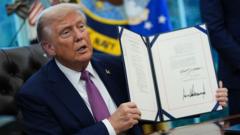Will Trump's New Order Hold Countries Accountable for Detaining Americans?

Published: 2025-09-06 19:35:09 | Category: wales
President Donald Trump has signed an executive order designed to penalise countries that detain US citizens unlawfully, empowering the State Department to impose sanctions through a new designation system. This move aims to safeguard American nationals from wrongful detention around the globe, with Secretary of State Marco Rubio emphasising the order's potential to impose severe penalties on offending nations.
Last updated: 16 October 2023 (BST)
Key Takeaways
- The executive order allows for a new designation for countries involved in wrongful detention of US citizens.
- Sanctions may include economic penalties and restrictions on visas.
- At least 54 Americans were reportedly wrongfully detained in 17 countries in 2024.
- The order also targets non-state actors controlling significant territories.
- During his administration, Trump has secured the release of 72 American detainees.
Overview of the Executive Order
The executive order signed by President Trump establishes a framework for the US government to respond robustly to nations that engage in the wrongful detention of American citizens. This move is seen as a significant step towards protecting US nationals abroad and holds potential implications for international relations.
What is Wrongful Detention?
Wrongful detention refers to the unlawful arrest and incarceration of individuals, often without due process or fair trial. It can occur in various contexts, often with political motivations or as a means of leverage against foreign governments. The new executive order highlights the US government’s commitment to addressing this issue in relation to its citizens.
Designation of "State Sponsor of Wrongful Detention"
Under the new order, the State Department will have the authority to designate countries as "state sponsors of wrongful detention." This classification is reminiscent of the designation for state sponsors of terrorism and aims to create a reputational cost for countries engaging in these practices.
Potential Consequences for Designated Countries
Countries that receive this designation could face various penalties, including:
- Economic sanctions that could limit trade and investment
- Restrictions on visas for officials and citizens of the offending country
- Limits on foreign assistance from the US government
- Travel bans for US passport holders wishing to enter the offending country
The Role of the Foley Foundation
The Foley Foundation, named in honour of journalist James Foley who was murdered by ISIS, has played a crucial role in raising awareness about wrongful detentions. According to their 2024 report, wrongful detentions accounted for 83% of cases involving Americans held abroad. The foundation has been an advocate for the rights of detainees and has pushed for government accountability in these matters.
Reported Cases of Wrongful Detention
In 2024, it was reported that at least 54 Americans were wrongfully detained in 17 different countries. This statistic underscores the ongoing challenge of ensuring the safety and rights of American citizens abroad. Some notable cases include:
- Marc Fogel, an American teacher wrongfully detained in Russia.
- George Glezmann, who spent over two years in Taliban custody in Afghanistan.
Implementation Timeline and Future Actions
As of now, there is no clear timeline for when the Trump administration will take action against countries that may be classified under this new designation. The White House has indicated that the State Department will assess each situation carefully to determine appropriate responses.
Criteria for Determining Wrongful Detention
According to the Robert Levinson Act, which was passed during Trump's first term, several criteria can help determine whether an American is being wrongfully detained. These criteria include:
- The fairness of the judicial system in the detaining country
- If the detainee is held hostage for the purpose of extracting concessions from the US
Conclusion
The executive order signed by President Trump represents a significant shift in the US government's approach to wrongful detentions abroad. By empowering the State Department to impose sanctions and create a designation for offending countries, it aims to deter future incidents and protect American citizens globally. As the situation evolves, it will be crucial to monitor how effectively these measures are implemented and their implications for international diplomacy.
How will this new policy influence the treatment of US citizens abroad and the diplomatic relations between the US and other nations? #WrongfulDetention #USForeignPolicy #HumanRights
FAQs
What does wrongful detention mean?
Wrongful detention refers to the unlawful arrest and detention of individuals, often without fair trial or due process, typically for political reasons or as leverage.
What sanctions can be imposed on countries that wrongfully detain US citizens?
Sanctions may include economic penalties, visa restrictions, limits on foreign assistance, and travel bans for US citizens to the offending country.
How many Americans are wrongfully detained abroad?
In 2024, at least 54 Americans were reportedly wrongfully detained in 17 countries, according to the Foley Foundation.
What is the Foley Foundation?
The Foley Foundation is an advocacy group established in honour of journalist James Foley, focused on raising awareness about wrongful detentions and advocating for victims' rights.
What criteria does the US use to determine wrongful detention?
Criteria include the fairness of the judicial system in the detaining country and whether the detainee is held as leverage for concessions from the US government.



